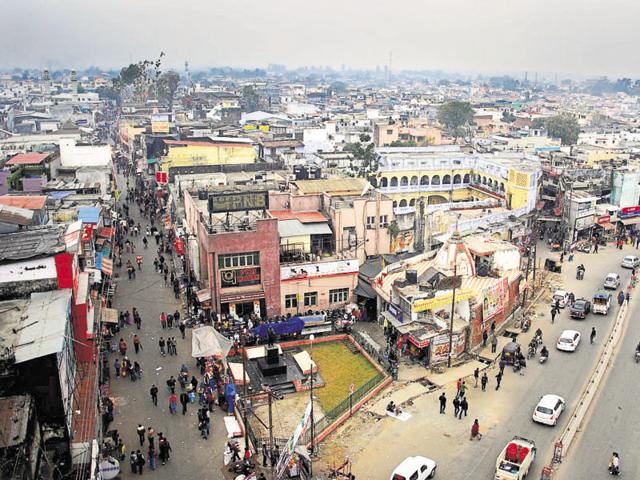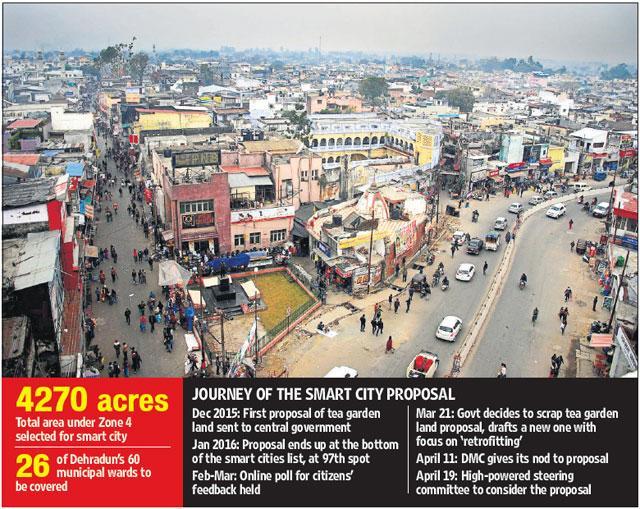Doonites have their say in smart city plan
In perhaps the first-of-its-kind example of citizens bulldozing their way into a smart city project and demanding their right to have a say in the planning process, residents of Dehradun have united under the banner of Citizens’ Action Group (CAG) in the last four-and-a-half months.
Since December, Abhijay Negi, a 22-year-old final-year student at National Law University in Jodhpur, has been going to his hometown, Dehradun, at least four times a month.

Negi has been doing these 800-km trips (one-way) because he wants to ensure that the city, which was once known for its thick green cover, litchi orchards and basmati rice, is not damaged further by “environment-unfriendly urban planning”.

In perhaps the first-of-its-kind example of citizens bulldozing their way into a smart city project and demanding their right to have a say in the planning process, residents of Dehradun have united under the banner of Citizens’ Action Group (CAG) in the last four-and-a-half months.
“We successfully forced the state government to scrap its plans to acquire tea garden areas, the green lung of the city, to build a greenfield smart city,” said Florence Pandhi, a resident of Dehradun for 40 years and a member of CAG.
Other NGOs and politicians of the BJP and the AAP also fought for the cause independently.
R Meenakshi Sundaram, vice chairman, Mussorie Dehradun Development Authority, and nodal officer, smart city project, told HT on Saturday that almost 80% of the proposals made by the citizens’ group matches with the authority’s new plan, which will be sent to the Centre by April 21.
“The revised plan has been made public for review. We may incorporate minor suggestions but it will be difficult to accommodate demands for major revamps,” he added.
Dehradun failed to make it to the top 20 cities shortlisted in January by the Centre for the first phase of the Smart Cities project. It will now compete with 22 other ‘fast-track’ cities.
The battle between the former Congress-led state government and the citizens started in November when the latter heard about the tea garden greenfield project. The state is now under President’s Rule since March 27.
“The Smart City Mission (SCM) guidelines say citizens have to be involved in the decision-making process but the government tried to bypass the process,” claimed Pandhi. “When we heard about the environmentally-destructive plan, the residents formed CAG and chalked out a declaration of our demands.”
Instead of a greenfield city, the residents want Dehradun to be freed of over-construction, crumbling infrastructure, lack of water supply, sewerage network and poor solid waste management and crowded/broken roads.
Govt campaign Under pressure, the state government launched a huge social media campaign about the smart city plan and held an online poll between February 28 and March 22.
Sundaram, however, denied that public pressure led to such a citizen-engagement programme.
“Protests or no protests, we would not have gone ahead with the earlier plan since it was rejected by the Centre. We had to rectify the mistakes of round one.”
The polling wasn’t controversy-free either. Residents alleged that government was asking many to vote for the greenfield option and that www.mygov.in, the central government’s citizen-centric platform, malfunctioned and their votes were not recorded. Sundaram denied these allegations.
Finally, a meeting of the high-powered steering committee on the project decided that the tea garden plan would be scrapped and retrofitting of some parts of the city will be included in its proposal. This option, the panel said, had got the maximum votes.
While Prime Minister Narendra Modi has said citizen’s participation is one of the key elements of smart city programmes, the experience has been uneven in India.
The success of such citizen engagement, say experts, will depend on whether city leaderships have appetite for it.
“This is an age of ‘OPEN’ - open data, open information, open digital, and open governments. Those governments that recognise early enough that this is a genie that is not going back in the bottle, will survive and then thrive if they encourage more transparency and more participation,” explained Swati Ramanathan, chairperson of Jana Urban Space and co-founder of Janaagraha.
“The key to meaningful participation is putting in place the institutional platforms and systems. This is not easy rhetoric, it is hard stuff. Question is do our cities have the appetite and leadership for it?” Ramanathan said.
Many also claim equity should be the key of any citizen engagement. “If smart cities are being planned as solutions to urban development with better services and facilities, there has to be multi-level stakeholder engagement and this must include poorer sections,” said Tom Thomas, CEO, Praxis Institute of Participatory Practices.
NSN Murty, director and leader, Smart Cities, PwC India, said it is unfair to always blame bureaucrats and politicians: “It’s also the responsibility of citizens to keep an eye on the process. For example, in Bhopal, while the mayor took charge of the smart city outreach programme, citizens too responded in equal measure and enthusiastically.”
Highlights of smart city proposal
Intelligent poles with CCTV cameras, garbage bin and pollution sensors
Underground garbage bins
Electrification of buses and three-wheelers
Cycle tracks and walkways
Junction renovation
Clock Tower rejuvenation
Public bike sharing.





